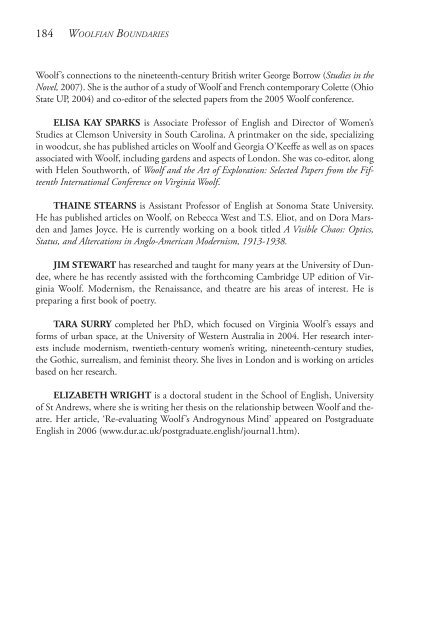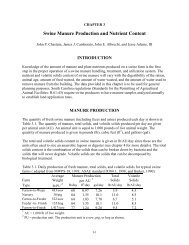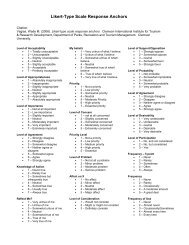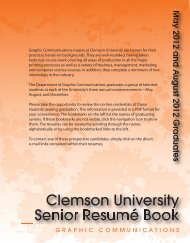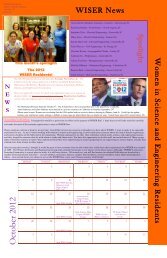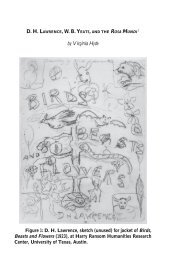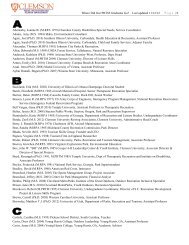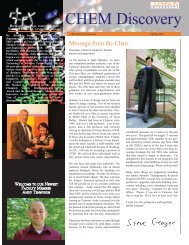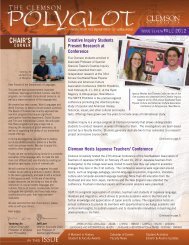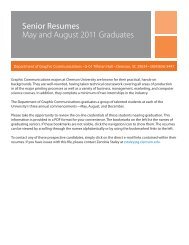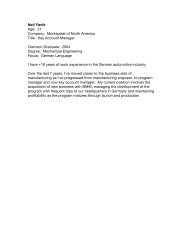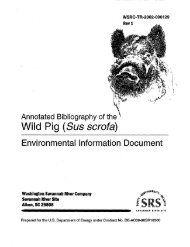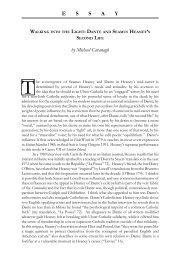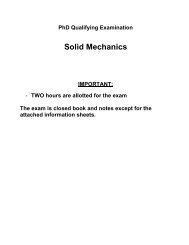Woolfian Boundaries - Clemson University
Woolfian Boundaries - Clemson University
Woolfian Boundaries - Clemson University
Create successful ePaper yourself
Turn your PDF publications into a flip-book with our unique Google optimized e-Paper software.
184 WOOLFIAN BOUNDARIES<br />
Woolf’s connections to the nineteenth-century British writer George Borrow (Studies in the<br />
Novel, 2007). She is the author of a study of Woolf and French contemporary Colette (Ohio<br />
State UP, 2004) and co-editor of the selected papers from the 2005 Woolf conference.<br />
ELISA KAY SPARKS is Associate Professor of English and Director of Women’s<br />
Studies at <strong>Clemson</strong> <strong>University</strong> in South Carolina. A printmaker on the side, specializing<br />
in woodcut, she has published articles on Woolf and Georgia O’Keeff e as well as on spaces<br />
associated with Woolf, including gardens and aspects of London. She was co-editor, along<br />
with Helen Southworth, of Woolf and the Art of Exploration: Selected Papers from the Fifteenth<br />
International Conference on Virginia Woolf.<br />
THAINE STEARNS is Assistant Professor of English at Sonoma State <strong>University</strong>.<br />
He has published articles on Woolf, on Rebecca West and T.S. Eliot, and on Dora Marsden<br />
and James Joyce. He is currently working on a book titled A Visible Chaos: Optics,<br />
Status, and Altercations in Anglo-American Modernism, 1913-1938.<br />
JIM STEWART has researched and taught for many years at the <strong>University</strong> of Dundee,<br />
where he has recently assisted with the forthcoming Cambridge UP edition of Virginia<br />
Woolf. Modernism, the Renaissance, and theatre are his areas of interest. He is<br />
preparing a fi rst book of poetry.<br />
TARA SURRY completed her PhD, which focused on Virginia Woolf’s essays and<br />
forms of urban space, at the <strong>University</strong> of Western Australia in 2004. Her research interests<br />
include modernism, twentieth-century women’s writing, nineteenth-century studies,<br />
the Gothic, surrealism, and feminist theory. She lives in London and is working on articles<br />
based on her research.<br />
ELIZABETH WRIGHT is a doctoral student in the School of English, <strong>University</strong><br />
of St Andrews, where she is writing her thesis on the relationship between Woolf and theatre.<br />
Her article, ‘Re-evaluating Woolf’s Androgynous Mind’ appeared on Postgraduate<br />
English in 2006 (www.dur.ac.uk/postgraduate.english/journal1.htm).


